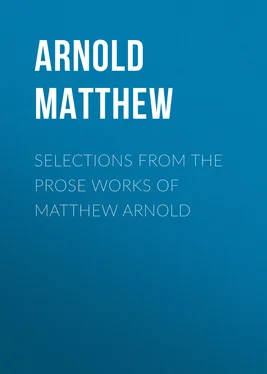Matthew Arnold - Selections from the Prose Works of Matthew Arnold
Здесь есть возможность читать онлайн «Matthew Arnold - Selections from the Prose Works of Matthew Arnold» — ознакомительный отрывок электронной книги совершенно бесплатно, а после прочтения отрывка купить полную версию. В некоторых случаях можно слушать аудио, скачать через торрент в формате fb2 и присутствует краткое содержание. Жанр: foreign_prose, literature_19, foreign_antique, на английском языке. Описание произведения, (предисловие) а так же отзывы посетителей доступны на портале библиотеки ЛибКат.
- Название:Selections from the Prose Works of Matthew Arnold
- Автор:
- Жанр:
- Год:неизвестен
- ISBN:нет данных
- Рейтинг книги:5 / 5. Голосов: 1
-
Избранное:Добавить в избранное
- Отзывы:
-
Ваша оценка:
- 100
- 1
- 2
- 3
- 4
- 5
Selections from the Prose Works of Matthew Arnold: краткое содержание, описание и аннотация
Предлагаем к чтению аннотацию, описание, краткое содержание или предисловие (зависит от того, что написал сам автор книги «Selections from the Prose Works of Matthew Arnold»). Если вы не нашли необходимую информацию о книге — напишите в комментариях, мы постараемся отыскать её.
Selections from the Prose Works of Matthew Arnold — читать онлайн ознакомительный отрывок
Ниже представлен текст книги, разбитый по страницам. Система сохранения места последней прочитанной страницы, позволяет с удобством читать онлайн бесплатно книгу «Selections from the Prose Works of Matthew Arnold», без необходимости каждый раз заново искать на чём Вы остановились. Поставьте закладку, и сможете в любой момент перейти на страницу, на которой закончили чтение.
Интервал:
Закладка:
So stated, these are but dry generalities; their whole force lies in their application. And I could wish every student of poetry to make the application of them for himself. Made by himself, the application would impress itself upon his mind far more deeply than made by me. Neither will my limits allow me to make any full application of the generalities above propounded; but in the hope of bringing out, at any rate, some significance in them, and of establishing an important principle more firmly by their means, I will, in the space which remains to me, follow rapidly from the commencement the course of our English poetry with them in my view.
Once more I return to the early poetry of France, with which our own poetry, in its origins, is indissolubly connected. In the twelfth and thirteenth centuries, that seed-time of all modern language and literature, the poetry of France had a clear predominance in Europe. Of the two divisions of that poetry, its productions in the langue d'oïl and its productions in the langue d'oc , the poetry of the langue d'oc , 90 90 ~Provençal~, the language of southern France, from the southern French oc instead of the northern oïl for "yes."
of southern France, of the troubadours, is of importance because of its effect on Italian literature;—the first literature of modern Europe to strike the true and grand note, and to bring forth, as in Dante and Petrarch it brought forth, classics. But the predominance of French poetry in Europe, during the twelfth and thirteenth centuries, is due to its poetry of the langue d'oïl , the poetry of northern France and of the tongue which is now the French language. In the twelfth century the bloom of this romance-poetry was earlier and stronger in England, at the court of our Anglo-Norman kings, than in France itself. But it was a bloom of French poetry; and as our native poetry formed itself, it formed itself out of this. The romance-poems which took possession of the heart and imagination of Europe in the twelfth and thirteenth centuries are French; "they are," as Southey justly says, "the pride of French literature, nor have we anything which can be placed in competition with them." Themes were supplied from all quarters: but the romance-setting which was common to them all, and which gained the ear of Europe, was French. This constituted for the French poetry, literature, and language, at the height of the Middle Age, an unchallenged predominance. The Italian Brunetto Latini, 91 91 Dante acknowledges his debt to ~Latini~ (c. 1230-c. 1294), but the latter was probably not his tutor. He is the author of the Tesoretto , a heptasyllabic Italian poem, and the prose Livres dou Trésor , a sort of encyclopedia of medieval lore, written in French because that language "is more delightful and more widely known."
the master of Dante, wrote his Treasure in French because, he says, "la parleure en est plus délitable et plus commune à toutes gens." In the same century, the thirteenth, the French romance-writer, Christian of Troyes, 92 92 ~Christian of Troyes~. A French poet of the second half of the twelfth century, author of numerous narrative poems dealing with legends of the Round Table. The present quotation is from the Cligés , ll. 30-39.
formulates the claims, in chivalry and letters, of France, his native country, as follows:—
"Or vous ert par ce livre apris,
Que Gresse ot de chevalerie
Le premier los et de clergie;
Puis vint chevalerie à Rome,
Et de la clergie la some,
Qui ore est en France venue.
Diex doinst qu'ele i soit retenue
Et que li lius li abelisse
Tant que de France n'isse
L'onor qui s'i est arestee!"
"Now by this book you will learn that first Greece had the renown for chivalry and letters: then chivalry and the primacy in letters passed to Rome, and now it is come to France. God grant it may be kept there; and that the place may please it so well, that the honor which has come to make stay in France may never depart thence!"
Yet it is now all gone, this French romance-poetry, of which the weight of substance and the power of style are not unfairly represented by this extract from Christian of Troyes. Only by means of the historic estimate can we persuade ourselves now to think that any of it is of poetical importance.
But in the fourteenth century there comes an Englishman nourished on this poetry; taught his trade by this poetry, getting words, rhyme, meter from this poetry; for even of that stanza 93 93 Chaucer's two favorite stanzas, the seven-line and eight-line stanzas in heroic verse, were imitated from Old French poetry. See B. ten Brink's The Language and Meter of Chaucer , 1901, pp. 353-57.
which the Italians used, and which Chaucer derived immediately from the Italians, the basis and suggestion was probably given in France. Chaucer (I have already named him) fascinated his contemporaries, but so too did Christian of Troyes and Wolfram of Eschenbach. 94 94 ~Wolfram von Eschenbach~. A medieval German poet, born in the end of the twelfth century. His best-known poem is the epic Parzival .
Chaucer's power of fascination, however, is enduring; his poetical importance does not need the assistance of the historic estimate; it is real. He is a genuine source of joy and strength, which is flowing still for us and will flow always. He will be read, as time goes on, far more generally than he is read now. His language is a cause of difficulty for us; but so also, and I think in quite as great a degree, is the language of Burns. In Chaucer's case, as in that of Burns, it is a difficulty to be unhesitatingly accepted and overcome.
If we ask ourselves wherein consists the immense superiority of Chaucer's poetry over the romance-poetry—why it is that in passing from this to Chaucer we suddenly feel ourselves to be in another world, we shall find that his superiority is both in the substance of his poetry and in the style of his poetry. His superiority in substance is given by his large, free, simple, clear yet kindly view of human life,—so unlike the total want, in the romance-poets, of all intelligent command of it. Chaucer has not their helplessness; he has gained the power to survey the world from a central, a truly human point of view. We have only to call to mind the Prologue to The Canterbury Tales
Конец ознакомительного фрагмента.
Текст предоставлен ООО «ЛитРес».
Прочитайте эту книгу целиком, купив полную легальную версию на ЛитРес.
Безопасно оплатить книгу можно банковской картой Visa, MasterCard, Maestro, со счета мобильного телефона, с платежного терминала, в салоне МТС или Связной, через PayPal, WebMoney, Яндекс.Деньги, QIWI Кошелек, бонусными картами или другим удобным Вам способом.
1
From Dr. Stanley's Lectures on the Jewish Church, Macmillan's Magazine , February, 1863, vol. 7, p. 336.
2
~Poetry and the Classics~. Published as Preface to Poems : 1853 (dated Fox How, Ambleside, October 1, 1853). It was reprinted in Irish Essays, 1882.
3
~the poem~. Empedocles on Etna .
4
~the Sophists~. "A name given by the Greeks about the middle of the fifth century B.C. to certain teachers of a superior grade who, distinguishing themselves from philosophers on the one hand and from artists and craftsmen on the other, claimed to prepare their pupils, not for any particular study or profession, but for civic life." Encyclopædia Britannica .
Читать дальшеИнтервал:
Закладка:
Похожие книги на «Selections from the Prose Works of Matthew Arnold»
Представляем Вашему вниманию похожие книги на «Selections from the Prose Works of Matthew Arnold» списком для выбора. Мы отобрали схожую по названию и смыслу литературу в надежде предоставить читателям больше вариантов отыскать новые, интересные, ещё непрочитанные произведения.
Обсуждение, отзывы о книге «Selections from the Prose Works of Matthew Arnold» и просто собственные мнения читателей. Оставьте ваши комментарии, напишите, что Вы думаете о произведении, его смысле или главных героях. Укажите что конкретно понравилось, а что нет, и почему Вы так считаете.












